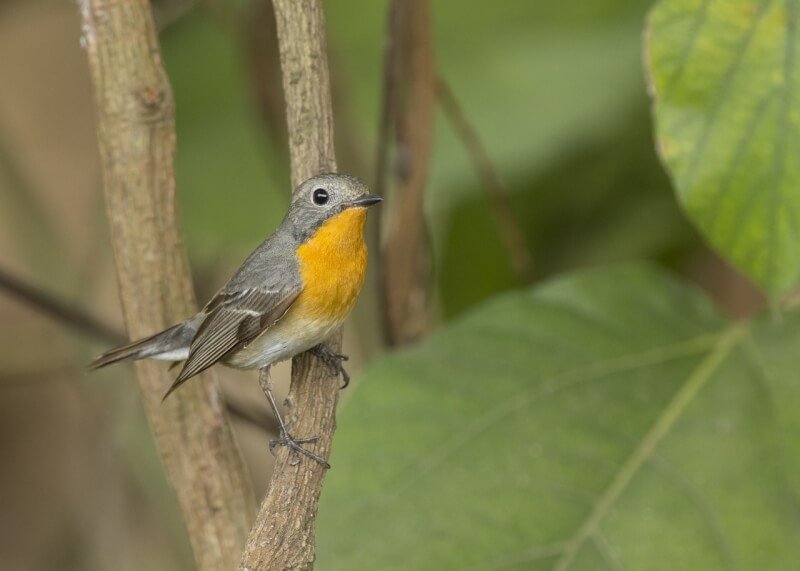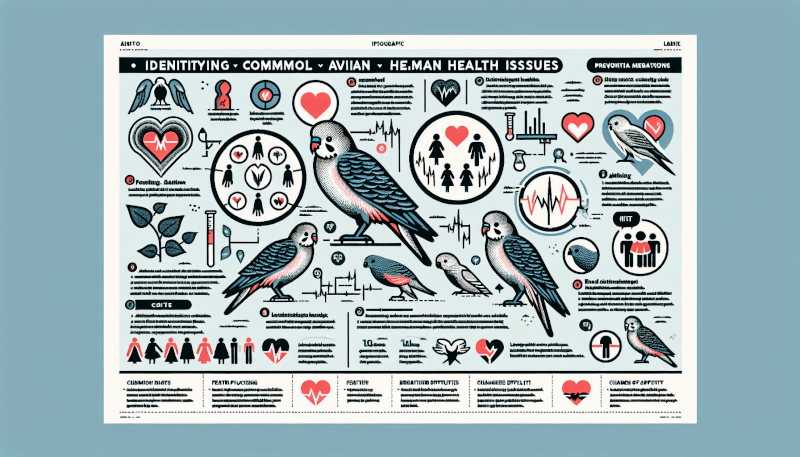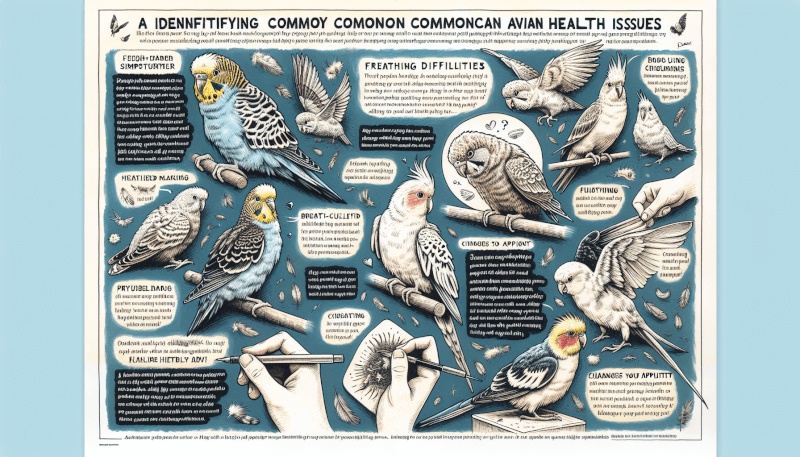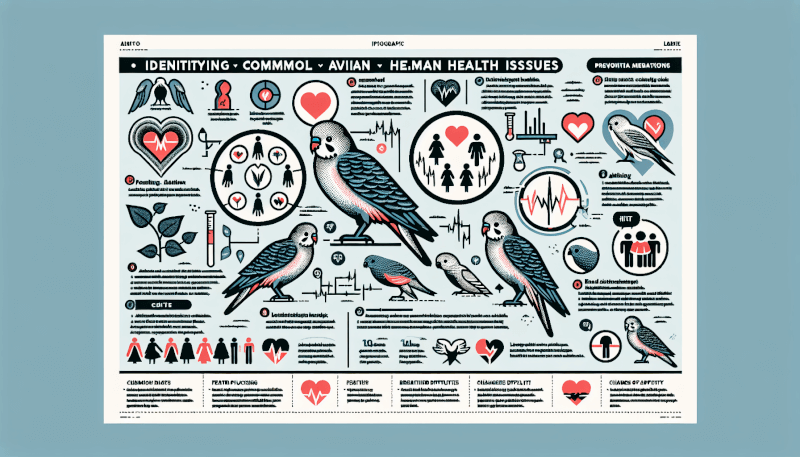In this article, you will discover valuable insights on how to identify common health issues in avian companions. By understanding the signs and symptoms of potential ailments, you can ensure the well-being and happiness of your feathered friend. From observing changes in their behavior to monitoring physical cues, this guide will equip you with the necessary knowledge to proactively address any health concerns that may arise. So, let’s embark on this journey together and become adept at recognizing and resolving common avian health issues.

Physical signs of illness
Changes in behavior
One of the first signs that your avian friend may be experiencing illness is changes in behavior. If you notice that your bird is suddenly acting differently, it may be an indication that something is not right. Look out for signs like lethargy, decreased activity, or excessive aggression. Birds are naturally active and social creatures, so a sudden change in their behavior should not be ignored. Keep an eye out for any unusual or uncharacteristic actions, as they can be important clues in identifying potential health problems.
Difficulty breathing
Difficulty breathing is a serious sign of illness in birds. If you notice your feathered companion breathing heavily or with effort, it is crucial to seek prompt veterinary advice. Respiratory issues can be caused by various factors, such as infections or environmental conditions. Keep an eye out for open-mouth breathing, wheezing, or rattling sounds when they breathe. Additionally, pay attention to any signs of increased respiratory rate or labored breathing, as these can be indicators of underlying health issues.
Abnormal feces
Monitoring your bird’s droppings is one of the easiest ways to assess their health. Normal bird droppings consist of three components: solid feces, clear urine, and a white or cream part known as urates. Any drastic changes in color, consistency, or smell should be noted. For instance, if you observe watery or loose droppings, it may indicate gastrointestinal distress. On the other hand, if the droppings appear abnormally dry or discolored, it could suggest dehydration or liver problems. Regularly inspecting your bird’s feces allows you to spot potential health issues and take appropriate action promptly.
Weight loss or gain
Birds, like humans, maintain a healthy weight range. Sudden changes in weight can indicate various health conditions. If you notice that your feathered friend has experienced a significant weight loss, it could be a sign of malnutrition, infection, or other underlying issues. Conversely, unexplained weight gain may be an indicator of obesity or hormonal imbalances. Regularly weighing your bird and keeping track of any fluctuations can help you identify potential health concerns and address them proactively.
Visible wounds or injuries
Visible wounds or injuries are obvious signs that your bird may be unwell. Whether it’s a cut, a scrape, or a swollen area, any physical damage to your bird’s body should not be ignored. Inspect your bird regularly for any visible signs of trauma, and if you find any, ensure you seek veterinary attention promptly. Failure to address wounds or injuries can lead to further complications and pose a risk to your bird’s overall well-being.
Respiratory issues
Sneezing
Occasional sneezing is normal for birds, just as it is for humans. However, if your feathered friend is constantly sneezing or sneezes excessively, it may be a cause for concern. Frequent sneezing could indicate an underlying respiratory infection, allergies, or irritants in their environment. Monitor your bird closely and consult with a veterinarian if sneezing becomes persistent or is accompanied by other respiratory symptoms.
Coughing
Coughing in birds is less common than in mammals, but it can still occur. If you hear your avian companion coughing, it is advisable to seek veterinary advice, as it could be a sign of respiratory distress or an infection. Coughing may also be a symptom of environmental irritants or the presence of foreign objects in the respiratory system. Prompt assessment and treatment can help prevent further complications and ensure your bird’s respiratory health.
Nasal discharge
Nasal discharge refers to any fluid or mucus coming from your bird’s nostrils. If you notice any discolored or excessive discharge, it may indicate respiratory infection or inflammation. Clear nasal discharge is usually normal, but any changes in color, consistency, or smell should be taken seriously. Monitor your bird closely for signs of nasal discharge and consult with a veterinarian for further evaluation and guidance.
Wheezing or rattling sounds
Wheezing or rattling sounds during your bird’s breathing are concerning signs of respiratory distress. These sounds may suggest the presence of mucus or fluid in their airways, making it difficult for them to breathe properly. Wheezing can be a symptom of respiratory infections, allergies, or even underlying heart conditions. If you hear these sounds, seek veterinary attention promptly to ensure your feathered friend receives the necessary care and treatment.
Digestive problems
Decreased appetite
A sudden decrease in appetite is a red flag that your bird may be experiencing health issues. Birds are generally enthusiastic eaters, so a loss of interest in food can signal a problem. If your feathered companion is avoiding their regular meals or showing disinterest in their favorite treats, it is essential to investigate further. Decreased appetite can be a symptom of various illnesses, including gastrointestinal problems, infections, or dental issues. Consult with a veterinarian to determine the underlying cause and provide the appropriate treatment.
Increased thirst or urination
If you observe your bird drinking excessive amounts of water or producing an unusually large volume of urine, it may indicate an underlying health problem. Increased thirst or urination can be indicative of kidney issues, hormonal imbalances, or diabetes. Monitor your bird’s water intake and urination habits, and consult with a veterinarian if you notice any significant changes or concerns.
Diarrhea
Diarrhea in birds is characterized by loose, watery, or unformed droppings. While occasional changes in droppings can occur due to dietary adjustments, persistent diarrhea is a sign of digestive problems. Diarrhea can result from infections, dietary changes, parasites, or other underlying health issues. If your bird’s droppings consistently show signs of diarrhea, consult with a veterinarian for a proper diagnosis and appropriate treatment.
Vomiting
Vomiting in birds is not as common as in mammals, but it can happen. If you notice your bird regurgitating or forcefully expelling food, it is crucial to seek veterinary attention. Vomiting can be a sign of gastrointestinal distress, infections, or even organ dysfunction. Proper evaluation and treatment by a veterinarian are vital to ensure your bird’s health and well-being.
Regurgitation
Regurgitation is a normal behavior for birds when it comes to feeding their young or bonding with their mates. However, if your bird exhibits regurgitation outside of these specific contexts, it may be a cause for concern. Inappropriate or excessive regurgitation can indicate underlying health issues such as hormonal imbalances or gastrointestinal problems. If you notice this behavior, consult with a veterinarian to determine the underlying cause and ensure proper care for your avian companion.
Skin and feather issues
Feather loss
Feather loss can be a significant concern in birds, as healthy plumage is crucial for their overall well-being. If you notice patches of missing feathers on your bird, it may indicate an underlying health problem. Feather loss can result from various factors, including infections, nutritional deficiencies, stress, or parasites. Regularly inspect your bird’s feathers and skin for any signs of bald patches, and seek veterinary advice to determine the cause and provide appropriate treatment.
Bald patches
Bald patches, areas of the skin where feathers are entirely absent, can be an alarming sight. Apart from moulting, which is a natural process in birds, bald patches are usually indicative of underlying issues. These issues can range from infections and allergies to hormonal imbalances or even self-mutilation behaviors. If you notice bald patches on your bird, consult with a veterinarian to identify the cause and develop a treatment plan.
Abnormal feather coloration
A change in feather coloration can be an indication of health problems in birds. If you observe any unusual or abnormal color patterns on your bird’s feathers, it is essential to investigate further. Discoloration can be a result of nutrient deficiencies, liver dysfunction, or even exposure to toxins. Regularly examine your bird’s feathers and seek veterinary advice if you spot any changes in coloration.
Swollen or scaly skin
Swollen or scaly skin is a noticeable sign of skin issues in birds. Swelling can be a symptom of an infection, injury, or even tumors. Additionally, scaly skin or flakiness may indicate underlying dermatological conditions, such as mites or fungal infections. Examine your bird’s skin carefully and consult with a veterinarian for proper diagnosis and suitable treatment options.
Bumps or lumps
Feeling bumps or lumps under your bird’s skin should be examined by a veterinarian. These abnormalities can be benign cysts, tumors, or abscesses. Prompt veterinary attention is crucial to determine the nature of these growths and provide appropriate treatment if necessary.

Eye and beak problems
Cloudy or swollen eyes
Cloudy or swollen eyes in birds can be a cause for concern, as it may indicate an infection or injury. If you notice any changes in your bird’s eye appearance, such as cloudiness, redness, or swelling, seek veterinary advice promptly. Eye issues can lead to vision problems and discomfort, so early detection and treatment are vital.
Discharge from the eyes
Discharge from your bird’s eyes, such as crustiness, excessive tearing, or pus-like material, can be an indication of an eye infection or inflammation. Regularly check your bird’s eyes for any signs of discharge and consult with a veterinarian to determine the underlying cause and receive appropriate treatment.
Crusty or overgrown beak
The beak is a vital part of a bird’s anatomy, and any abnormalities should be addressed promptly. If you notice your bird’s beak becoming crusty, growing excessively long, or showing signs of abnormal wear, it may warrant veterinary attention. Beak issues can affect a bird’s ability to eat, groom, and defend itself. A veterinarian will be able to assess the cause of the problem and recommend suitable solutions or treatments.
Changes in beak color
Changes in beak color can be indicative of underlying health issues. For example, a yellowing or darkening of the beak can be a symptom of liver disease, while a pale or whitish appearance may signal anemia or nutritional deficiencies. Regularly inspect your bird’s beak color and consult with a veterinarian if you notice any significant changes or concerns.
Changes in vocalization
Loss of voice
If your bird suddenly loses its voice and becomes unable to vocalize, it can be a sign of health issues. Loss of voice can stem from throat infections, respiratory problems, or even vocal cord damage. Monitor your bird’s vocalization and seek veterinary advice if you notice a sudden and prolonged loss of voice.
Excessive or unusual vocalization
Excessive or unusual vocalization may indicate underlying health or behavioral problems. If your bird becomes excessively loud, screams frequently, or exhibits abnormal vocalization patterns, it is crucial to investigate further. Such vocalization patterns could signify boredom, stress, or even pain. Consult with a veterinarian to determine the cause and provide appropriate care and enrichment for your bird’s well-being.
Changes in pitch or volume
Changes in the pitch or volume of your bird’s vocalizations can be indicative of health issues. If you notice abrupt changes in the way your bird sounds when vocalizing, it may be worth consulting with a veterinarian. These changes could be due to respiratory problems, throat infections, or even changes in the structure of the vocal apparatus.

Changes in perching or locomotion
Difficulty perching
Birds rely on their ability to perch for various activities, such as resting, sleeping, or eating. If you notice your bird having difficulty perching or spending less time on their perch, it may suggest health issues with their feet, legs, or joints. Monitor your bird’s perch behavior and consult with a veterinarian to assess any potential problems and provide appropriate care.
Limping or favoring one leg
Limping or favoring one leg can be a sign of injury, strain, or infection. Observe your bird’s movement closely and conduct a gentle examination of their legs to identify any signs of pain or discomfort. If you notice your bird is having difficulty walking or favoring one leg, it is essential to seek veterinary advice for a proper diagnosis and treatment.
Unsteady or awkward movement
Birds are known for their agile and graceful movement. If you observe your bird displaying unsteady or awkward movements, such as stumbling, falling, or being unable to maintain balance, it may indicate neurological or musculoskeletal problems. Prompt veterinary attention is crucial to assess the cause of these movement issues and provide appropriate care.
Paralysis
Paralysis is a severe sign of illness or injury in birds. If your bird appears unable to move one or more parts of its body or is completely immobilized, it requires immediate veterinary attention. Paralysis can result from trauma, infections, or underlying neurological conditions. Quick intervention is necessary to identify the cause and provide suitable treatment options.
Changes in feather grooming
Excessive preening
Preening is a natural behavior for birds, as it helps keep their feathers clean and healthy. However, if your bird engages in excessive preening, to the point where it becomes obsessive or affects their daily activities, it may indicate health or behavioral issues. Excessive preening can result from skin irritation, allergies, or stress. Monitor your bird’s preening habits and consult with a veterinarian if you notice any concerning changes or behaviors.
Lack of preening
On the flip side, a lack of preening can also be a sign of health problems in birds. If you notice that your bird has stopped preening altogether or shows a significant decrease in grooming, it may indicate underlying pain, illness, or discomfort. Regularly observe your bird’s grooming behavior and consult with a veterinarian if you notice any changes that raise concerns.
Difficulty grooming certain body parts
If you notice your bird struggling to groom specific body parts or avoiding grooming altogether, it may be indicative of discomfort or pain in those areas. Birds use their beaks to groom and maintain their feathers, so any difficulty in reaching certain areas can suggest pain or mobility issues. Monitor your bird closely and consult with a veterinarian to address any potential health concerns.

Circulatory and heart issues
Weakness or lethargy
Weakness or lethargy in birds can be indicative of circulatory or heart problems. If your bird appears weak, has difficulty moving, or shows a lack of energy, it is crucial to seek veterinary advice. Circulatory and heart issues can significantly impact your bird’s overall well-being and require prompt attention to ensure proper diagnosis and treatment.
Pale or bluish discoloration of tissues
A pale or bluish discoloration of tissues, especially the feet, legs, or beak, can be a serious sign of circulatory or respiratory problems. This discoloration may indicate reduced oxygen levels in the blood, which can endanger your bird’s health. If you notice any abnormal coloration in your bird’s tissues, consult with a veterinarian immediately for proper evaluation and intervention.
Irregular heart rate
Monitoring your bird’s heart rate can provide valuable insights into their circulatory health. While a slight variation in heart rate can be normal, a consistently irregular heartbeat should be investigated further. An irregular heart rate can be a symptom of heart conditions, infections, or underlying systemic issues. Consult with a veterinarian to assess your bird’s heart health and determine the best course of action if irregularities are detected.
Swelling of the limbs
Swelling of the limbs can indicate fluid retention or other circulatory issues in birds. If you notice your bird’s legs or wings appearing swollen or their feet becoming enlarged, it is important to seek veterinary advice promptly. Swelling can be a sign of heart problems, liver dysfunction, or even obstructions in the circulatory system. Early detection and appropriate treatment can help prevent further complications and ensure your bird’s well-being.
Changes in reproductive behavior
Egg binding
Egg binding is a serious condition that occurs when a bird is unable to pass an egg. It primarily affects female birds, particularly those that are not receiving suitable nutrition or calcium supplementation. If you notice your female bird showing signs of strain, discomfort, or failure to lay eggs, it is essential to seek immediate veterinary attention. Egg binding can be life-threatening if not treated promptly, so professional intervention is crucial.
Difficulty laying eggs
Difficulty laying eggs can be a sign of reproductive issues in female birds. If you observe your bird repeatedly struggling or taking an extended time to lay an egg, it may indicate underlying problems. Egg retention, egg malformation, or other reproductive disorders can lead to difficulties during the laying process. Consult with a veterinarian to identify the cause of these difficulties and provide appropriate care.
Abnormal nesting behavior
Abnormal nesting behavior can be a clue that your bird is experiencing reproductive issues. Females may show signs of agitation, restlessness, and persistent nesting behaviors without producing any eggs. Similarly, males may display territorial aggression or excessive courtship behaviors. If you notice these abnormal nesting behaviors, consult with a veterinarian to explore potential reproductive problems and receive guidance on how to address them.
Changes in mating behavior
Changes in mating behavior can indicate hormonal imbalances or other reproductive issues in birds. If your bird’s mating behaviors become erratic, aggressive, or abnormal, it may be worth consulting with a veterinarian. These changes can signify underlying health problems that require evaluation and appropriate management.
By familiarizing yourself with the commonly observed signs of illness in birds, you can play an essential role in monitoring and maintaining the health of your avian friend. Regular observation, prompt veterinary attention when necessary, and providing a healthy and stimulating environment are essential for your bird’s overall well-being. Always remember that early detection and appropriate intervention can greatly improve the chances of a successful recovery for your feathered companion.


